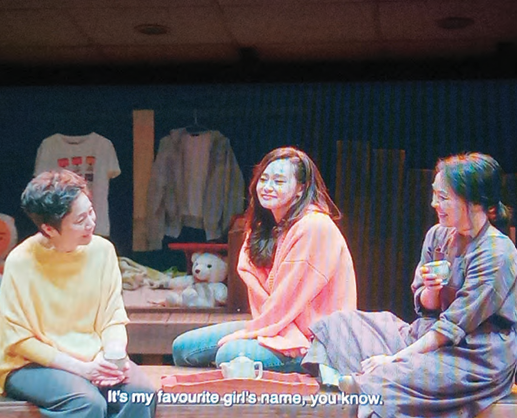On the surface, Nigeria and Korea appear to have nothing in common. How could they? The latter is more democratically and socio-economically advanced than Nigeria; and is among the top five countries leading global information and technological revolution.
But there are more similarities between the peoples of Korean and Nigeria than meets the eye. These similarities were addressed in ‘Long Live Women’, a Seoul Arts Center, Sac On Screen recorded theatric production screened at the Korean Culture Center Nigeria (KCCN) in Abuja.
Set in contemporary period, ‘Long Live Women’, spotlights the plight of three women, across three generations in a patriarchal Korean society. 70-year-old Lee Yeo-ja, who married a stranger as a teenager owing to poverty, and forced to leave her only child with a cheating husband, who wasted no time marrying his mistress. A timid, overworked Choi Seo-hee balancing a silk-tailoring business, with house chores and the demands of an overbearing mother-in-law; and Mi-nam, a 30-something year-old actress paying-off a long-term housing loan incurred by her deceased father whilst navigating unwanted sexual advances and misogynist views of women in her workplace.
Together these women are a reflection that no matter how evolved a nation is, many women are bound by some outdated social etiquettes/values of a patriarchal society, particularly when they are not financially liberated.
It goes without saying that majority if not all part of global societies is patriarchal in nature, and that not all patriarchal societies subjugate women. However, it does indicate that when gender isn’t consciously mainstreamed into a polity, and women decisively included in spheres of decision-making, they’d remain oppressed even in a modern society – be it in the form of sexual harassment, choosing marriage as a means to escape subjugation – which almost never works, or marrying young to escape poverty.
Much worse is the fact that “women are their own worse enemies”. This is perfectly embodied by Lady Hong, who treats her daughter-in-law, Choi Seo-hee as little more than a workhorse, married to be at her beck and call. Lady Hong belittles Seo-hee, actively ensures that she has no life – be it as the capable entrepreneur she could be, or to remarry, while she (Hong) schemes to enkindle a romance with an old friend.
One must appreciate the production’s point in supporting certain reasonable expectations in a marriage, especially with a good spouse, that is not necessarily patriarchist. For instance, a daughter-in-law can be expected to care for a sickly mother-in-law for a brief while that the latter will live with them. But that role can be alternated if the husband has other siblings who can comfortably cater to their mother’s care.
But it is not all gloom and doom, it is a dramedy after all. The production that adequately balanced comedy with drama in the production, via the three characters – the producer, Gang Nam-ja, and the vain Shin-ae, portrayed by one actor.
There is also a heartwarming camaraderie exuded in the interactions between and amongst the three generation of women that makes the bitter-sweet, open-ending more tolerable.
‘Long Live Women’ calls its Nigerian viewers to reexamine their society and themselves; to check their self-biases, double standards, social norms, and cultural traditions that denigrate women, and at the same time, shows that more can be gained from a patriarchy that values and treats women fairly (as Sung-min Kim does Seo-hee).
We’ve got the edge. Get real-time reports, breaking scoops, and exclusive angles delivered straight to your phone. Don’t settle for stale news. Join LEADERSHIP NEWS on WhatsApp for 24/7 updates →
Join Our WhatsApp Channel










